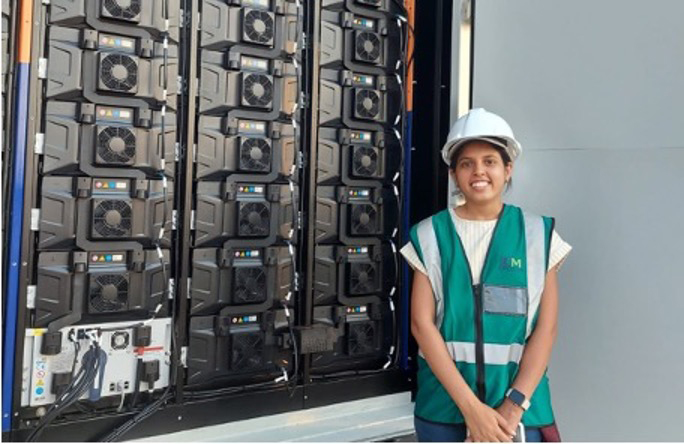
Navigating the Energy Transition: Batteries and Policy in Emerging Economies
Mrigi Munjal is a second-year graduate student in the Technology and Policy Program (TPP) and the Department Materials Science and Engineering (DMSE).
What is the focus of your research? What sort of knowledge and disciplines does it bring together? How will it make an impact?
Currently, I am working on a project under the guidance of Professor Elsa Olivetti in the Department of Materials Science and Engineering. My research involves using Natural Language Processing tools to learn challenges and their mitigation strategies through published literature to push the boundaries of the manufacturing scale-up of Sodium-ion Batteries. With the help of insights from literature on Lithium-ion batteries, the aim is to accelerate the pace of scale-up for Sodium-ion batteries, which can serve as a cheaper alternative for grid-scale energy storage applications. This interdisciplinary research topic helps me combine aspects of manufacturing scalability of emerging technologies with materials synthesis knowledge, and perfectly balances my DMSE and TPP personalities. I believe that this diverse toolkit will be very crucial to address the complexity of new and emerging technologies coupled with a compelling need to scale them up faster to meet climate change targets.
Why did you choose to come to TPP?
I did my undergrad in Metallurgical Engineering and Materials Science at IIT Bombay in India. As an undergraduate researcher, I worked on the experimental synthesis of sodium-ion battery materials. Through internships in consulting and an early-stage energy startup as well as classes on sustainability, I began to appreciate that understanding the technological aspects of the energy transition is just one part of the puzzle. Policy plays a crucial role in enabling or hindering such transitions. By studying policy alongside technology, I aim to understand how policies can facilitate the effective and equitable adoption of new energy technologies.
You interned with Catalyst Energy. Who did you work with and what did you do there?
Catalyst Energy is an energy advisory and project development company that exists to accelerate the deployment of sustainable energy solutions in southern Africa. I worked with the founder and Lead Principal on assessing the commercial use cases for Battery-based Energy Storage Systems in Southern Africa. I also got a chance to visit current and upcoming energy storage projects in South Africa and Malawi and set up meetings with various stakeholders working in the area. My time in South Africa (and briefly in Malawi) was funded through the MIT-Africa program under MISTI.
How did the internship connect to your current research and future plans?
The internship experience provided me with valuable insights into the impact of use cases on technology selection for grid-scale energy storage, and the variations in use cases worldwide. It also gave me a better understanding of the current state of energy storage deployment and the factors that influence the decision-making process.


